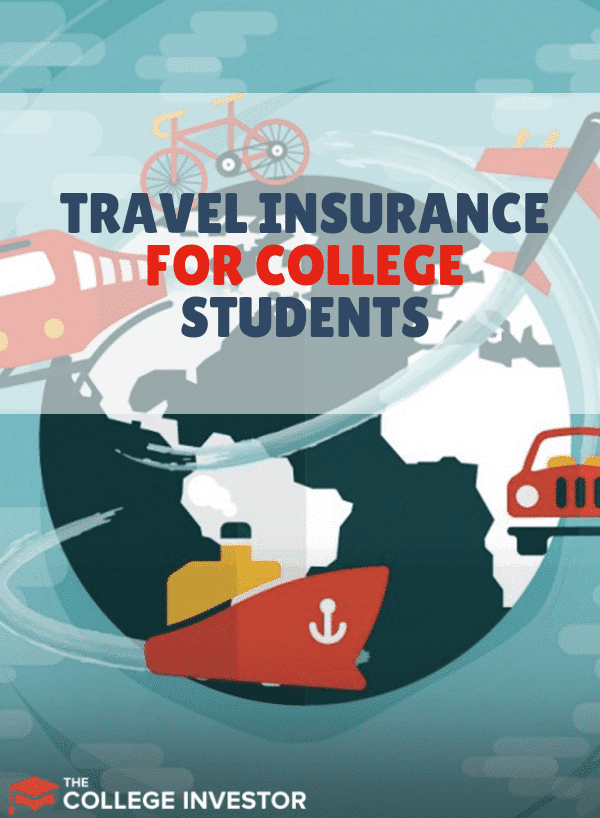
Many college students treasure their international travel or study-abroad experiences. But these adventures often come with a hefty price tag (especially given the low incomes of most students).
Most students don’t even consider insuring their travel, but in some cases that’s a financially responsible choice. Is travel insurance worth the cost? What should you insure, and what can you skip?
If you know you're interested in travel insurance, and just want a quick quote, check out Travelex Travel Insurance. You can get a quote for your trip in minutes.
What Does Travel Insurance Usually Cover?
Travel insurance is niche insurance product, so it can be difficult to understand. It’s particularly difficult to understand because every travel insurance policy will be a little different. Here are few types of coverage you can expect from a good travel insurance policy.
Trip Cancellation Coverage
You can recover your out-of-pocket expenses if you cancel a trip (for covered reasons), and your hotel or air carrier doesn’t give you a full refund. Covered reasons often include illness or a death in the family, mandatory evacuation (for example, due to a terrorist event) or weather-related issues.
Sometimes trip cancellation policies cover you if your travel company experiences bankruptcy or similar financial problems and is not operational by the time of your trip. Uncovered reasons usually include that you don’t feel like going anymore.
Missed Connection Coverage
If a delayed flight will keep you from making your trip on the Trans-Siberian railroad, you probably won’t get a refund from either the airline or the railroad company. However, missed connection coverage will issue you a refund, or pay for the extra transit costs that will allow you to catch a missed cruise, tour, or railroad.
Trip Interruption Coverage
Stuck in the airport due to bad weather? Trip interruption can give you the funds you need to stay in a hotel. It can also refund unused hotel costs or travel costs if you get sick, someone dies, or you need to interrupt your trip for another covered reason. Covered reasons of course vary by carrier and could include things like weather-related damage.
Medical/Emergency Evacuation Coverage
Coming down ill during a trip or a study-abroad experience can be bad news. Many travel insurance policies cover emergency medical transport back to the United States. Emergency evacuation is a similar policy that covers transit back home if the area you’re in has a mandatory evacuation. This is not the same as health insurance.
Baggage Loss or Delay Coverage
If your bags are lost or stolen during a flight, train ride, or other similar transit, travel insurance may reimburse you for the value of the items in your bag. It may also reimburse you for up to $100 per day (or more depending on the policy) for items you need to purchase if your bags are delayed. These almost never cover electronics or medications, so it’s best to keep those on hand.
Note: The best travel rewards credit cards typically offer baggage loss or delay coverage as well.
Emergency Document Recovery
Some travel policies will reimburse you for fees you incur if your passport or visa is lost or stolen. Most of the time, you’ll find this as a subset of the covered costs in trip interruption services, so read that section carefully.
What You Probably Won't Find
One thing you won’t find in most travel insurance policies is travel health insurance. Travel health insurance covers the cost of medical care while abroad. If you’re on a short trip, you can probably rely on your primary health insurance (though you should check your insurance company’s website to learn about how they treat international care).
Traveling for a long period of time means that you may want to buy international health insurance from a private company or from your employer or sponsoring university if you’re studying or working abroad.
Is Travel Insurance the Same as the Coverage from My Credit Card?
If you’re like most college students, you probably aren’t qualified for the best travel rewards credit cards. In general, travel credit cards from Chase and American Express offer extensive travel insurance benefits to authorized cardholders. However, the travel insurance is only applicable when the cost is incurred in association with travel that’s been paid for using the Chase or American Express credit card.
Most college students won’t have access to the travel benefit perks of these cards, but if you have a travel credit card, read the fine print. You may find that you’re covered for most or all of your risks while abroad.
On the other hand, if you’re studying abroad, using a credit card with limited protections, or using cash or a debit card to pay for your expenses abroad, you may want to look into trip or travel insurance.
When Should Students Buy Travel Insurance?
When studying abroad, most students should buy international health insurance. This can be a group plan through your host university, or a policy you buy independently.
Aside from travel health insurance and emergency medical evacuation coverage, most travel insurance is optional. Depending on the policy, you can expect total travel insurance coverage to cost about $5 to $15 per day, but the costs depends on the length of the trip, the cost of the trip, and more.
For most college students, the biggest reason to purchase travel insurance isn’t to cover the cost of the trip. Ideally, you’re travelling frugally, so insuring your actual trip isn’t too important. However, you still need to consider insuring against those massive costs that could hit you while traveling. For example, an emergency/medical evacuation coverage policy makes sense in almost all travel situations. If you become ill or get hit by a car, you’re going to want to get back to family as efficiently as possible. Unfortunately, when this involves international travel, the costs can add up quickly.
The other commonly overlooked reason to buy travel insurance is to cover missed connections. You’ll rarely find this covered by credit card insurance policies, and I’ve known many people who had to pay for cruises they never took thanks to a missed connection. That said, good planning, and a willingness to lose some money, renders trip interruption or cancellation coverage less necessary.
Best Places to Find Travel Insurance for College Students
Once the trip dates are set, it’s up to you to find the best rates for insurance. When buying trip insurance, be sure to understand what your policy covers, and what it does not. Remember, most travel plans do not include health insurance (for routine maintenance), and they may have limits on covered emergency medical services. Read the limits carefully before deciding on a plan.
Health Insurance
Employer or university health insurance: Be sure to check whether you can get a discount by buying insurance through an employer or your university.
Private companies:
Medical Evacuation Only
These companies offer plans that only cover emergency evacuation during medical or natural disasters. For the most part, these are not comprehensive insurance plans, but they cover one of the biggest travel risks at a fairly low cost.
Here are the companies:
Total Travel Insurance
Travelex: Travelex has been offering travel insurance for over 55 years and is a leader in the space, specializing in travel insurance. Check out Travelex here >>
InsureMyTrip: This is a travel insurance comparison site that will help you compare most of the major carriers of travel insurance. It also allows you to specify coverage options that make sense for you.
Allianz Travel Insurance: One of the leading travel insurance companies, you can get a quote for your trip in minutes and decide if it's worth it.
Final Thoughts
Travel insurance is one of those things that you don't need, unless you need it. So, you may not like the thought of paying any additional money for your trip. But, if something does happen, that small up front investment can be very worthwhile.

Robert Farrington is America’s Millennial Money Expert® and America’s Student Loan Debt Expert™, and the founder of The College Investor, a personal finance site dedicated to helping millennials escape student loan debt to start investing and building wealth for the future. You can learn more about him on the About Page or on his personal site RobertFarrington.com.
He regularly writes about investing, student loan debt, and general personal finance topics geared toward anyone wanting to earn more, get out of debt, and start building wealth for the future.
He has been quoted in major publications, including the New York Times, Wall Street Journal, Washington Post, ABC, NBC, Today, and more. He is also a regular contributor to Forbes.
Editor: Clint Proctor Reviewed by: Chris Muller
